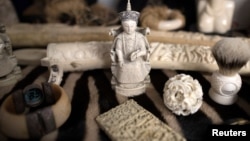Britain will ban the sale of ivory items regardless of their age in an effort to restrict the illegal ivory trade, tackle poaching and help protect elephants, the government said on Tuesday.
New legislation will create the toughest ban on ivory in Europe and one of the toughest in the world, it said, with a prohibition on the sale of nearly all antiques containing ivory.
International commercial trade in ivory has been illegal since 1990 and the sale of raw African Elephant ivory of any age is not authorized in Britain.
But currently, worked items produced before 1947 can be traded within Britain or other EU countries, as can items produced after 1947 that have government certificates.
Environment Secretary Michael Gove said the tougher restrictions, which follow a public consultation, would demonstrate Britain's belief that "the abhorrent ivory trade should become a thing of the past."
"Ivory should never be seen as a commodity for financial gain or a status symbol, so we will introduce one of the world's toughest bans on ivory sales to protect elephants for future generations," he said in a statement.
There will be exemptions for antique items that contain less than 10 percent ivory by volume, some old musical instruments, and the rarest and most important items of their type, including portrait miniatures painted on slivers of ivory.
The World Wide Fund for Nature (WWF) said around 55 African elephants were killed for their ivory a day, with their tusks turned into carvings and trinkets.
"This ban makes the U.K. a global leader in tackling this bloody trade, and it's something WWF has been fighting hard for," chief executive Tanya Steele said.
"But if we want to stop the poaching of this majestic animal, we need global action. We hope the U.K. will continue to press countries where the biggest ivory markets are, most of which are in Asia, to shut down their trade too."





